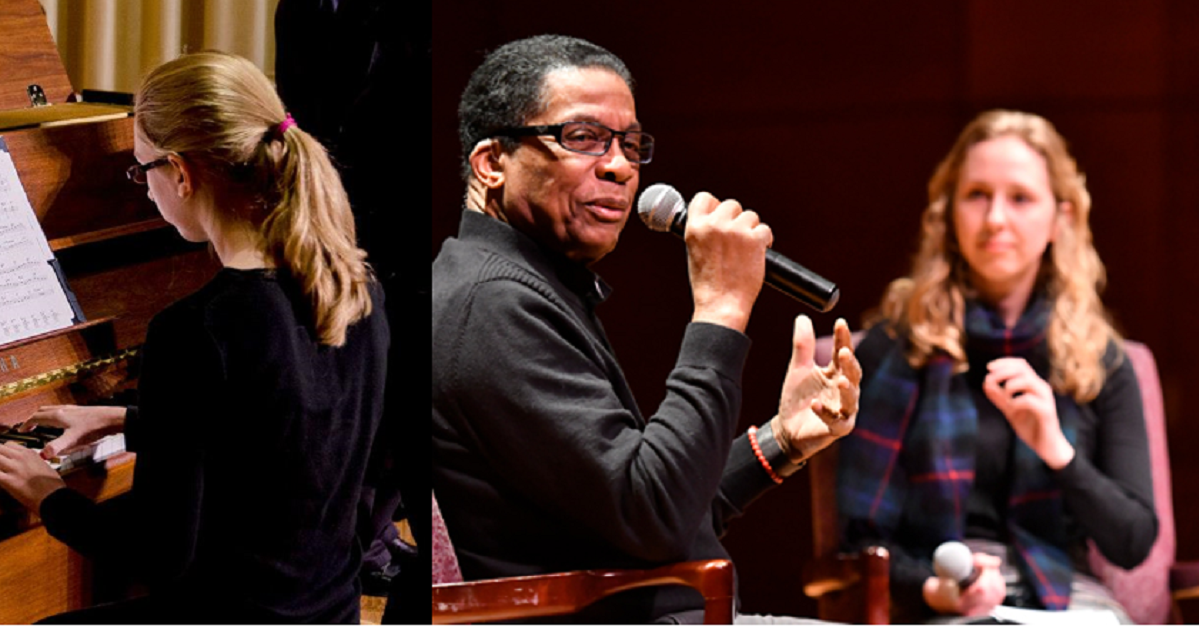
The power to unite us and teach us
Recently, UNCG student and JazzArts Charlotte alumni Julia Whalen was honored to interview a musical hero, Herbie Hancock. We take this opportunity to discover Julia’s journey in music and beyond.
March, 2019 –– Music has been one of the most important parts of my education for as long as I can remember. My mother plays classical piano, and since my brother, sister and I were young, my parents made it a point to involve us in music. At home, we were exposed to all sorts of genres. We listened to Louis Armstrong, Paul Simon, Ella Fitzgerald, the Beatles, Pete Seeger, Bob Marley, Michael Jackson, B. B. King, Aretha Franklin, and many others. When my mom worked for the Charlotte Symphony, we would come listen to the orchestra concerts with her.
At age 9, my mom was my first piano teacher. I used to love playing the beginner book duets with her. I joined the school band in sixth grade and played the clarinet through both middle and high school. I don’t miss the clarinet one bit but I sure loved band. I can’t imagine school without it.
I joined Jazz Arts Initiative’s Youth Ensemble when I was entering high school and continued through my senior year. I knew nothing about improvisation. The idea of performing music that you make up on the spot was terrifying. It’s still funny for me to think about the fact that I play jazz, when it is so completely different from my personality. I have always been reserved, and like to have things planned out in detail before I do them. Jazz challenges my natural instincts in every way. I think that’s why I’ve never been able to let go of it.
Learning to play jazz forced me out of my comfort zone. I had to solo and have the attention of the audience and the group on me. I had to leave some things up to chance and be ok with mistakes. This is what is so important about jazz education. It challenges you not only as a musician, but as a person. It would take pages for me to explain all that jazz has taught me, but I knew, after doing JAI, that jazz would always be involved in my life in one form or another.
When I started college at UNC Greensboro, I did not plan on being a jazz studies major. I have always intended on working with immigrant communities, so I applied to the school under public health. It only took one semester of jazz combos and jam sessions for me to realize that I learn more by studying jazz than any other subject. By second semester of freshman year, I had changed to a jazz studies and French major. I was worried at first about joining a group of students who had planned for years to become professional musicians, but my experience with JAI allowed me to transition smoothly in. Not many other students have the opportunity to study jazz in high school at the same level that we do with Jazz Arts Initiative.
I still plan to work with refugee and immigrant nonprofits and have been volunteering with a community center in Greensboro for several years. The first thing I wanted to know when I joined the community center was whether or not there was a music program. I talked with the director of our jazz studies program at UNCG, and we made it happen. We collected instruments, gathered volunteers, and organized a jazz combo for teenagers from refugee families. I’ve spent much of the past two years coaching and working to sustain that combo. It was not easy, but I knew that there was so much the students could gain.
At the moment, I am studying jazz in France. It is comforting that, no matter where you are in the world, jazz musicians are still jazz musicians. It is a language and culture in itself. When I return to the U.S. for my senior year, I hope I can continue to work with international populations in a music context. Music has so much power to unite us and teach us.
My personal playlist tends to focus on one or two albums that I listen to until I’m ready to transition to something new. I like a lot of genres. These past months, I’ve been stuck on the Miles Ahead album, Miles Davis, 1957, and one tune, “My Little Brown Book”, from the Duke Ellington and John Coltrane album in 1963. In the months before that, I was listening almost exclusively to two Brazilian albums, both in the samba genre: Espiral de Illusao by Criolo and The Best of Olodum, a carnival samba group. (I had just taken a class on Brazil).
For more on Julia’s interview with Herbie Hancock at UNCG, click here.